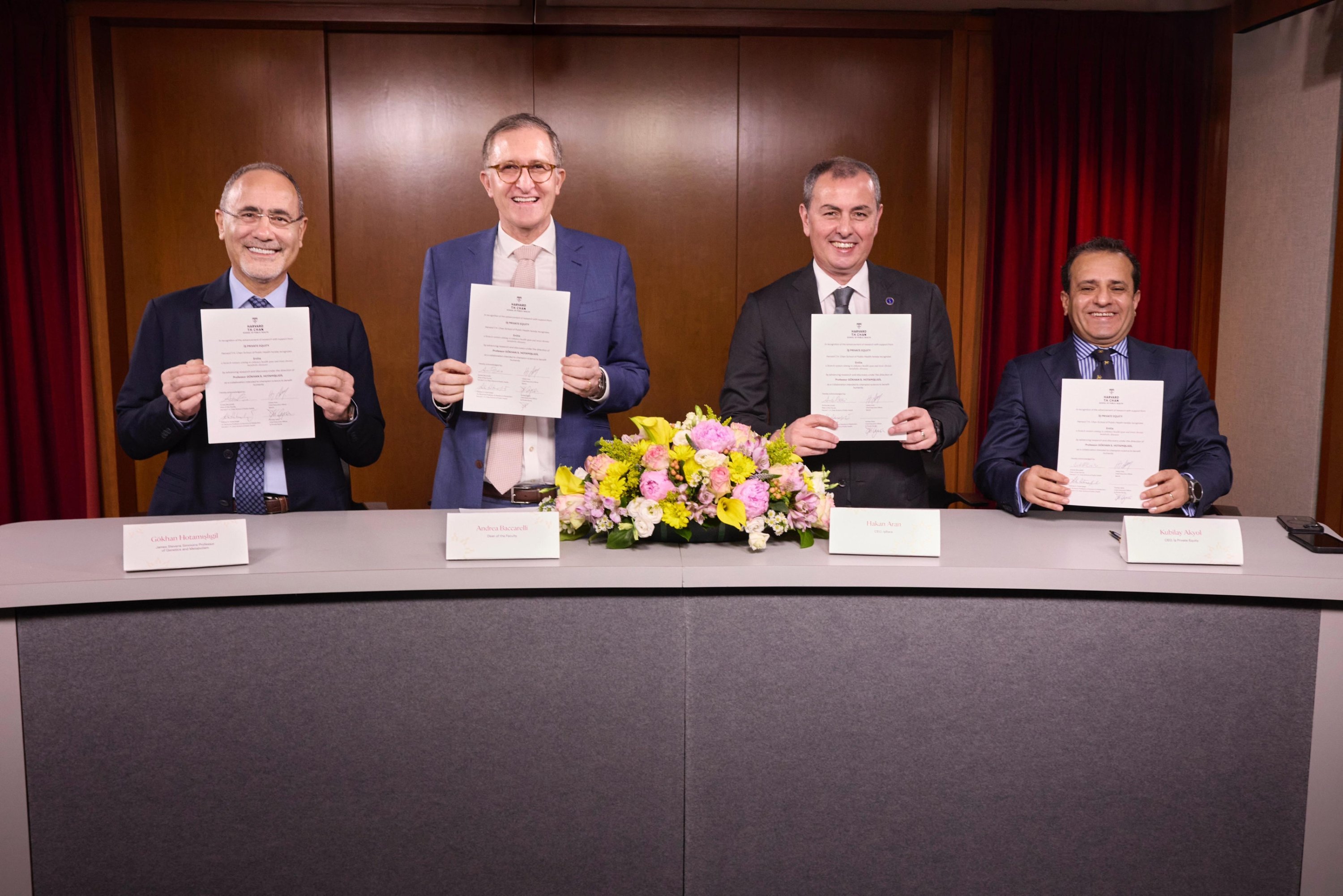© Turkuvaz Haberleşme ve Yayıncılık 2026
In a strategic move to boost digital sovereignty and reduce foreign dependency, Türkiye this week launched two major initiatives focused on artificial intelligence and location-based services.
The calls, announced by Industry and Technology Minister Mehmet Fatih Kacır, aim to accelerate the development of a Turkish-language large language model (LLM) and domestically developed navigation and mapping applications.
The initiatives are part of Türkiye's broader national vision to reduce external dependency in location-based services and artificial intelligence infrastructure, as it seeks to secure technological autonomy, generate economic value, and enhance defense and public sector capabilities through local innovation
"In line with our National Artificial Intelligence Strategy, we are launching the 'Turkish Large Language Foundation Model Sectoral Adaptation Project Call,'" Kacır said on social media platform X.
"With this call, through which we will provide grant support of up to TL 50 million ($1.26 million) per project, we will both enhance the representation power of the Turkish language in artificial intelligence and strengthen our technological independence by developing large language models that will offer specific solutions to our sectors," the minister said.
The government, Kacır said, will continue to take steps that will make Türkiye "one of the pioneering countries of the new digital age shaped by AI technologies and reinforce our AI ecosystem with reliable and high value-added solutions."
The call is open to startups and technology developers focusing on applications in finance, health, education and energy.
The second initiative aims to replace foreign-based digital maps with homegrown navigation and mapping technologies.
"With the aim of developing national solutions in the strategically important field of location-based services and paving the way for innovative applications, we have launched the 'Mapping and Navigation Application Development Projects Call,'" Kacır said.
Withing th escope of the initiative, the minister stressed the aim to develop high-performance, user-friendly and AI-supported navigation applications with innovative features that meet the needs of users in Türkiye, such as communication with emergency services (112), carbon footprint calculation and access to real-time traffic data.
"I invite our investors and industry stakeholders to participate in this program, which we launched to strengthen our digital sovereignty, bolster the domestic ecosystem in mapping and navigation, and enhance our international competitiveness," Kacır said.
As part of the initiatives, processing of users' location data through domestic infrastructure will be encouraged in line with the principles of digital sovereignty and data independence.
Domestic domestic navigation and map applications will be prioritized across all commercial applications, especially in critical sectors, and a variety of innovative, localized functions are expected to emerge.
Features such as 112 integration, carbon footprint calculation and real-time traffic data delivery will be mandatory.
Strategically adapted navigation services for defense and public agencies are also a key goal. By integrating artificial intelligence, Türkiye seeks to facilitate modern applications with user-friendly and high-performance interfaces.
With the call announced on Monday, grants of up to TL 50 million ($1.26 million) per project will be provided to initiatives that will develop Turkish large language models tailored to specific sectors.
The final application deadline has been set as Aug. 29. The project aims to reduce dependency in Turkish-language AI initiatives. It is planned to develop large language models that reflect the linguistic and cultural depth of Turkish.
The government's aim is to support models that can be deeply adapted to areas such as finance, health care, education and energy.
Iş Private Equity, the venture capital arm of Türkiye Işbank Group, has announced its investment in Enlila, a biotechnology startup born out of a research collaboration with the Hotamisligil Laboratory at Harvard T.H. Chan School of Public Health.
The venture aims to develop innovative treatments for obesity and age-related diseases, building on groundbreaking scientific discoveries led by Gökhan Hotamışlıgil, a James S. Simmons Professor of Genetics and Metabolism at the Harvard T.H. Chan School of Public Health.
The move supports what is emerging as one of the most pressing global health challenges. According to the World Health Organization, nearly 890 million people are affected by obesity globally, a number that is expected to surpass 1.5 billion by 2035.
Simultaneously, the global biotechnology market had reached a size of $1.37 trillion as of 2023, and it is expected to surpass $3.8 trillion by 2030 with a compound annual growth rate of 13.9%.
As a Türkiye-based global biotechnology player, Enlila will contribute to the country’s science and technology-focused export capacity and play a leading role in promoting qualified academic collaborations.
The Enlila initiative draws from research conducted at Harvard by professor Hotamışlıgil, who identified novel metabolic hormone systems playing a central role in how aging impacts flexibility and adaptation in human metabolism.

"As we age, we lose our metabolic flexibility and adaptability, which accelerates the onset of many diseases," Hotamışlıgil said in his speech at the signing ceremony.
"My lab has identified new metabolic hormone systems that play a central role in these processes and demonstrated their potential as therapies in preclinical models. This fund will support and accelerate our search for solutions to obesity and age-related diseases. We are committed to advancing this vision," he noted.
Speaking at the ceremony, Işbank General Manager Hakan Aran said they were launching a global-scale collaboration in the fields of science and technology, marking the bank’s second century.
"As our founder Gazi Mustafa Kemal Atatürk stated, science is the most reliable guide in life, for material things, for spirituality, for life itself, and for success. The journey we are embarking on with Enlila is extremely valuable in light of our group’s mission. This innovative initiative, to be carried out in partnership with Harvard University, opens new doors for a high-quality, disease-free life by combining the power of science and finance under the umbrella of academia-industry cooperation," Aran said.
He stressed that they take great pride and satisfaction in playing a role in transforming a scientific discovery into a potential treatment for chronic diseases associated with aging and obesity.
"This partnership is not just an investment for us; it means being part of a vision that offers hope to humanity. In parallel with academic efforts, the newly established biotech venture Enlila will work to translate discoveries with significant potential for healthy living into real treatments," he noted.
"We firmly believe that this vision, born under the leadership of Turkish scientists at one of the world’s premier scientific institutions like Harvard, will become a success story in the global health ecosystem."
Kubilay Aykol, general manager of Iş Private Equity, said biotechnology entrepreneurship is not only one of today's strategic growth areas but also one of the most vital for the next century.
"Being a player in this field offers opportunities to create value across science, health care, and the economy. With Enlila, which we’ve headquartered in Türkiye, our goal is to support the development of a treatment that can address chronic diseases linked to aging and obesity," Aykol said.
"We at Iş Private Equity take great pride in leading this initiative, which gives life to a globally applicable treatment originating from Türkiye. By being part of such a unique structure, we believe we can contribute to our country, the scientific community and all of humanity."
A new global study by Amazon Web Services (AWS) highlights the growing influence of generative artificial intelligence in reshaping business operations, as the demand for AI-skilled professionals surges across industries.
AWS surveyed 3,739 IT decision-makers across nine countries for its "Generative AI Adoption Index," which reveals the pace and scope of AI integration among organizations.
One of the most striking findings is the rapid rise of the Chief AI Officer role: 60% of organizations have already appointed someone to this position, while another 26% plan to do so by 2026.
The report anticipates a major hiring wave in 2025. An overwhelming 90% of organizations say they intend to hire professionals with generative AI expertise, and a quarter of those surveyed noted that at least half of their new roles will require generative AI skills.
Berrin Özselçuk, AWS Türkiye country manager, said generative AI is transforming not only how routine tasks are automated but also how creativity is enhanced and decision-making is optimized, fundamentally changing the way businesses operate.
To harness the full potential of generative AI, Özselçuk emphasized three strategic priorities for organizations: implementing change management frameworks, overcoming educational barriers and collaborating with strategic partners.
Industry-specific data from the report further underscores the shift. In the IT sector, 35% of organizations expect more than half of new roles to require AI competencies, while in manufacturing, this figure stands at 28%.
As companies confront a widening talent gap, many are ramping up their training initiatives.
Half of the organizations surveyed have developed education plans to bridge AI skill shortages, and three-quarters say they are prioritizing investments to upskill their existing workforce.
About 56% of respondents have already launched training programs focused on generative AI. Another 19% plan to roll out such initiatives by the end of 2025.
Türk Telekom, one of Türkiye's leading telecoms and technology companies, has offered free wireless internet access across all 81 provinces of the country to mark World Wi-Fi Day on June 20.
As wireless connectivity continues to grow in speed and scope worldwide, it is also proving to be a crucial solution to key accessibility issues. In Türkiye, Türk Telekom has played a central role in this expansion, bringing high-speed fiber infrastructure to every province.

The company is delivering uninterrupted internet service in thousands of locations, including cultural centers like the Atatürk Cultural Center (AKM), museums, stadiums, libraries, public transport, and in-flight environments.
"We are leading Türkiye's digital transformation with our wide range of innovative digital services, which we proactively update to bring cutting-edge capabilities to our customers," said Zeynep Özden, deputy general manager in charge of marketing and customer experience at Türk Telekom.
As a result of this vision, Özden said, the company is equipping the country with end-to-end fiber internet, "connecting lives by providing high-speed access to customers in every corner of all 81 provinces."
"On the occasion of World Wi-Fi Day, we're proud to offer our Wi-Fi services free of charge at thousands of locations. With our human-centered approach, we will continue to bring innovative technologies and the riches of the digital world to our customers."
